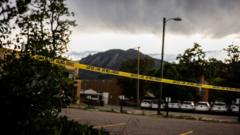In a startling revelation, the FBI disclosed that Mohammed Sabry Soliman, the man accused of throwing Molotov cocktails at pro-Israel demonstrators in Boulder, Colorado, had meticulously planned the attack for an entire year. The 45-year-old Egyptian national faces multiple charges, including federal hate crimes and state charges of attempted murder and assault, following a violent confrontation during a demonstration for Israeli hostages on Sunday.
On the day of the incident, Soliman allegedly hurled two incendiary devices into a gathering at the Pearl Street Mall, resulting in injuries to eight individuals. Eyewitness accounts indicate that as he threw the Molotov cocktails, he shouted "Free Palestine," a statement that underscored the charged atmosphere of the event. In the aftermath, law enforcement discovered at least 16 unlit Molotov cocktails in proximity to the scene, further corroborating the seriousness of the planned assault.
Among the injured victims was Rabbi Israel Wilhelm, a Holocaust survivor and Chabad director at the University of Colorado Boulder. The attack coincided with the beginning of the Jewish holiday of Shavuot, heightening the distress experienced by the community. As initial reports noted eight injuries, four more individuals later came forward, prompting a broader recognition of the attack's impact.
Soliman's brief court appearance showcased a man who appeared detached from the gravity of the allegations. He responded only minimally to the judge's procedural inquiries, while plans were set for a formal charge filing later this week. Authorities assert that he acted independently, as a subsequent interview with law enforcement revealed that Soliman had meticulously plotted the attack after his daughter’s high school graduation. He reportedly expressed a desire to "kill all Zionists," mirroring the motivations behind his hateful actions.
As the investigation unfolded, details emerged revealing that Soliman had sought out online resources to perfect his methods of creating incendiary devices. Notably, his immigration status impacted his capabilities, as he famously opted for Molotov cocktails over firearms due to restrictions related to his concealed-carry permit application. Besides the incendiary devices, police recovered a backpack sprayer filled with octane gasoline.
According to court documents, Soliman traveled from Colorado Springs just minutes before the demonstration began, allegedly purchasing gasoline en route. Law enforcement officials published his statements reflecting a deep-rooted hatred towards those he targeted, framing his actions as part of a larger conflict surrounding the Palestinian territories.
Community reactions have been swift, with political figures and activists condemning the attack as a manifestation of rising antisemitism in the U.S. Amid discussions of accountability, Acting U.S. Attorney J. Bishop Grewell reaffirmed the commitment to holding Soliman responsible for his actions. As the FBI continues to gather evidence regarding Soliman’s background, the case highlights a growing concern for the safety of Jewish communities amidst the backdrop of escalating global tensions related to the Israel-Gaza conflict.
Acknowledging the attack's resonance within the broader narrative of violence directed at Jewish individuals in the U.S., many community leaders call for unity and resilience in the face of hate, seeking to foster dialogue and understanding while demanding robust measures against hate crimes.
On the day of the incident, Soliman allegedly hurled two incendiary devices into a gathering at the Pearl Street Mall, resulting in injuries to eight individuals. Eyewitness accounts indicate that as he threw the Molotov cocktails, he shouted "Free Palestine," a statement that underscored the charged atmosphere of the event. In the aftermath, law enforcement discovered at least 16 unlit Molotov cocktails in proximity to the scene, further corroborating the seriousness of the planned assault.
Among the injured victims was Rabbi Israel Wilhelm, a Holocaust survivor and Chabad director at the University of Colorado Boulder. The attack coincided with the beginning of the Jewish holiday of Shavuot, heightening the distress experienced by the community. As initial reports noted eight injuries, four more individuals later came forward, prompting a broader recognition of the attack's impact.
Soliman's brief court appearance showcased a man who appeared detached from the gravity of the allegations. He responded only minimally to the judge's procedural inquiries, while plans were set for a formal charge filing later this week. Authorities assert that he acted independently, as a subsequent interview with law enforcement revealed that Soliman had meticulously plotted the attack after his daughter’s high school graduation. He reportedly expressed a desire to "kill all Zionists," mirroring the motivations behind his hateful actions.
As the investigation unfolded, details emerged revealing that Soliman had sought out online resources to perfect his methods of creating incendiary devices. Notably, his immigration status impacted his capabilities, as he famously opted for Molotov cocktails over firearms due to restrictions related to his concealed-carry permit application. Besides the incendiary devices, police recovered a backpack sprayer filled with octane gasoline.
According to court documents, Soliman traveled from Colorado Springs just minutes before the demonstration began, allegedly purchasing gasoline en route. Law enforcement officials published his statements reflecting a deep-rooted hatred towards those he targeted, framing his actions as part of a larger conflict surrounding the Palestinian territories.
Community reactions have been swift, with political figures and activists condemning the attack as a manifestation of rising antisemitism in the U.S. Amid discussions of accountability, Acting U.S. Attorney J. Bishop Grewell reaffirmed the commitment to holding Soliman responsible for his actions. As the FBI continues to gather evidence regarding Soliman’s background, the case highlights a growing concern for the safety of Jewish communities amidst the backdrop of escalating global tensions related to the Israel-Gaza conflict.
Acknowledging the attack's resonance within the broader narrative of violence directed at Jewish individuals in the U.S., many community leaders call for unity and resilience in the face of hate, seeking to foster dialogue and understanding while demanding robust measures against hate crimes.




















